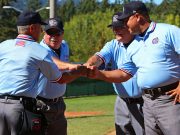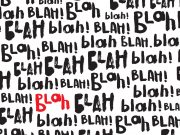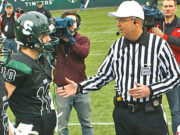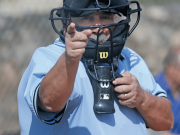Art Of Officiating
Home Art Of Officiating
Covering conflict management, the psychology of officiating, best practices and officiating/life balance.
Why We Officiate
1. Camaraderie
The fellowship and humor officials share with one another are incomparable.
2. Boos
There’s nothing like fans booing when you have the silent satisfaction of...
Ride The Rhythm Of Your Season
Rhythm generally means a movement marked by the regulated succession of strong and weak elements, or of opposite/different conditions, and every sports official knows...
Why Are You Talking?
When it comes to the necessities needed in becoming a successful sports official, the art of conversation might not seem to be high on...
Pregame Meeting Etiquette
Pat the referee arrives at Hometeam High School for a basketball game. With Chris, the inexperienced partner, in tow, Pat approaches Hometeam Head Coach...
Are You Good or Great?
W
hat attributes separate good officials from average officials? That question has been posed often over the years. While there doesn’t seem to be a...
Fight Negative Comments with Finesse
Sometimes people will make negative comments knowing you’re an official. So how should you react? Here’s a vote for speaking up on behalf of...
What It Takes To Get What You Want
S
ome years ago, Brian Tracy, one of the world’s leading experts in personal development, said, “Success is goals and all else is commentary.”
Imagine the...
How To Handle a Kicked Call
A
s a longtime NCAA Division I college women’s basketball official, Mark Zentz says there’s a surefire way for him to know when he’s blown...
How To Develop The Mental Skills to Thrive as an Official
How to develop the mental skills needed to thrive and advance in officiating.
By Karen Swanner
D
o you have the mental skills to become one of...
The Right Way to Share and Accept Criticism
W
hich of the following is defined as “the art, skill or profession of making discriminating judgments”?
a. Sports officiating.
b. Studying texts for the purpose of...
Honesty, Integrity Keys to a Full Schedule
The ability to grow your schedule is a key component to your development. We all want more games because we associate the number of...
Are You a Reactor or a Decision-Maker?
Officials must be decision-makers versus reactors. Officials are trained to
make decisions based on plays and not just be reactors to the action. Rely...
How to NOT Argue
It takes a minimum of two people to have an argument. If one person chooses not to participate, that leaves the second party blustering...
7 Steps To Better Conversations
Dealing with adversarial relationships can be tough. These seven tips to better conversations will make your difficult job a bit easier.
1. Pause before responding
Let the other person get...
Tips For Improving Sportsmanship
Turn on SportsCenter any morning and while you sip your coffee I’ll guarantee you something. Within the first 10 minutes, a big-time coach will...
Use Team Captains as Assets
Being captain on a team is a pretty big deal. It means the player has earned the trust and respect of his or her coach or teammates. It’s...
Don’t Let Self-Criticism Detract From Your Successes
Think about how many times in your career you received real-time praise from a fan, a coach or a player. Compare that with the number of times you...
Does the Stop Signal Work Anymore?
Check out this portion of a discussion thread from a basketball referee online chat circa 2007:
“Anybody ever notice how a lot of the talk...
Warning Signs of Burnout
People officiate for a variety of reasons. Whether it’s love of the game, exercise, camaraderie or extra money (or any combination of those), too...
53 Things Every Rookie Should Know
1 You learn how to better express yourself so others understand exactly what you mean
2 You’re going to get yelled at.
3 You’re going to...
Techniques to Speed Up Games
One of the great debates in sports these days is how long it takes to play the games. Television has been a great boon...
How To Get A Postseason Assignment and Make The Most Of It
How do you get a postseason assignment? What skills are important when doing those big games? How do you stay at the top when...
Effective Relationships With Coaches
I was working a boys’ basketball game a few years back and the home team was getting shelled. They couldn’t shoot, pass, handle the...
Conflict of Interest?
Conflict of interest. Whether it actually exists between an official and coach or administrator or family member or whatever the case, when that phrase...


































